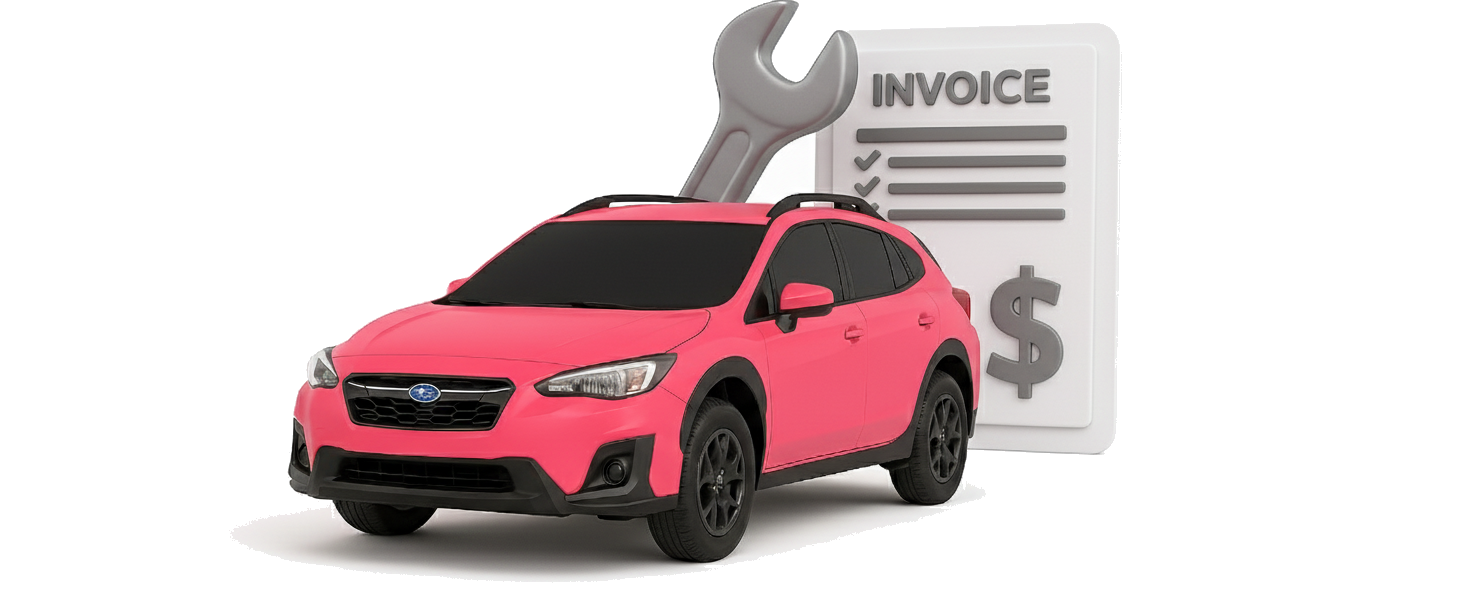On vehicles with tight access (some V6/V8, AWD or luxury models), the bill can climb to $900–$1,100 due to added labor.
If your car allows a solenoid-only service, replacement may fall closer to $120–$300—but those designs have been largely phased out. Through the 1970s–1990s, several Ford, GM and Chrysler vehicles used a fender-mounted starter solenoid that could be replaced separately. Today, most starters have an integrated solenoid, meaning the whole unit is replaced.
If your symptoms are vague, use the Jerry app to get guidance on likely culprits before heading to a shop.
Real customers Jerry has helped
Costs for getting your starter repaired depend on your exact vehicle, where you live and the quality of parts used. With Jerry, you can quickly see what drivers are paying right now. Below are real examples of customers we’ve helped secure top prices for when they need their starters repaired.
Estimates are modeled based on real vehicle and location data; names have been changed. Actual prices will vary by shop, parts, and vehicle condition.
Cost breakdown: Why the price varies
Several factors drive your final price—and each can swing your starter replacement cost meaningfully:
Parts choice:
New OEM: $300–$600
Quality remanufactured: $180–$400 (Denso, Bosch, Mitsubishi Electric, BBB Industries)
Vehicle design:
Easier layouts: ~0.7–1.2 hr (Many GM LS V8 trucks and older Toyota RWD 4-cyl)
Medium: ~1.5–3 hr
Difficult layouts: ~3–6+ hr starters under intake manifolds/subframes add time. (Honda/Toyota V6 minivans and SUVs, BMW N52/N54/N55 inline-6, some Audi V6)
Labor rate by facility:
Independents: ~ $90–$140/hr
Dealers: ~ $140–$200/hr
Diagnostics:
A $50–$150 starting/charging system test prevents misdiagnosis.
Other factors:
Core charges: $30–$80 refundable (DIY only)
Corroded cables/ignition switch repair $50–$300
Flywheel/ring gear: Rare, but $800+ due to transmission removal
Use Jerry to compare shops that know your engine layout—matching the right tech can cut labor time and headaches and lower your starter repair cost.
What is a starter?
The starter is a compact electric motor bolted to your engine that spins the crankshaft until combustion takes over. When you turn the key or push the start button:
- The solenoid pushes the starter’s gear into the flywheel or flexplate.
- The starter motor draws high current from the battery to spin the engine.
- Once the engine fires, the gear retracts.
Signs you need a starter replaced
Before replacing anything, techs look for patterns. So you should first run a diagnostic check in the Jerry app after looking out for symptoms that commonly point toward the starter or its circuit:
- Single, solid click with no crank: Solenoid engages but motor won’t turn (worn brushes/dead spot possible).
- Rapid clicking or dim lights: Often a weak battery or poor connections; load-test battery and check grounds.
- Grinding noise on start: Pinion-to-flywheel mesh issue—worn drive, misalignment or ring gear damage.
- Whirring/spinning without engine turning: Weak solenoid or slipping starter drive.
- Intermittent no-start when hot (heat soak): Heat raises resistance; marginal components fail when hot.
- Smoke or burning smell: Electrical overload or internal failure—stop and test.
Quick checks:
- Try starting in Neutral; if it cranks, suspect a neutral safety switch.
- Tap the starter lightly while cranking; a single success suggests a dead spot—schedule service.
- If it won’t crank hot but will when cooled, suspect heat-related resistance—ask the shop to test hot and check TSBs.
Your action plan: How to save money
Reduce costs and headaches with a few smart moves your mechanic would approve of:
Confirm it’s the starter:
Ask for a battery load test, alternator output and voltage-drop tests. Aim for ≥9.6V cranking, ≤0.5V positive, ≤0.3V ground and current draw in spec.
Compare parts options: Quality remans (Remy, BBB, Bosch/Denso reman) often match new for less. Ask about bench test and warranty.
Mind the access:
If intake/subframe removal is required, labor time is the lever. Request book hours on the estimate.
Keep the core:
Return the old starter to recover the $30–$80 core (DIY only).
Bundle minor related fixes:
Replace corroded terminals/grounds while you’re there to avoid repeat no-starts. Use the Jerry app to check if any other scheduled maintenance reminders
Ask about diagnostics credit:
Many shops apply the diagnostic fee to the repair.
Look for TSBs:
Some models have heat-soak, relay or wiring TSBs that shortcut guesswork.
Choose timing wisely:
If it intermittently starts, schedule now to avoid a tow.
What to ask a shop (quick script):
- “Please complete a battery and electrical system test with a detailed printout.” (Many shops have a battery tester tool capable of doing this.)
- “Quote parts brand/warranty and list labor book hours.”
Red flags:
- No documented test results; vague “electrical issue” charges; no parts brand/warranty.
Use the Jerry app to compare line-item quotes locally before you commit.
Related repairs
Starter problems can overlap with other components in the starting circuit. Here are the usual suspects that other Jerry customers have found and how they affect costs:
- Battery and terminals: A weak battery or corroded terminals can mimic a bad starter. Batteries run $120–$300; terminals/cable ends $25–$100.
- Alternator/charging issues: If the alternator isn’t recharging the battery, you’ll see repeated no-starts. Alternator replacement typically runs $350–$800.
- Starter relay/ignition switch/neutral safety switch: These control the starter’s signal. Expect $80–$350 depending on diagnosis and access.
- Ground straps and main cables: High resistance kills starter performance. Cleaning or replacing cables is often <$150.
- Flywheel ring gear: Uncommon but expensive due to labor; can exceed $800 as the transmission must be removed.
DIY vs. Pro: Can I do this myself?
If you’re handy and your starter is easy to access, DIY is possible—but the margin for error is small due to high current and tight spaces.
Pro tip: Always disconnect the negative battery cable to prevent arcing; follow torque specs and any alignment procedures (critical on some older vehicles). If you go pro, ask for an itemized estimate (brand, warranty, labor hours) and test results.
When doing repairs on electrical components, it’s always a good idea to check for loose or corroded parts in the area of the electrical part to make sure there’s nothing to reduce current flow and hinder performance.

What our customers are asking us
-
Is it OK to buy a remanufactured starter?
-
Can jump-starting fix a bad starter?
-
How long do starters last?
-
Can I replace just the solenoid?
-
Do I need to disconnect the battery?
-
What tests confirm a bad starter?
-
Could software or the immobilizer be the cause?
-
Any recalls I should know about?

Jerel Lawrence is an experienced and certified automotive technician with a strong foundation in diagnostics, repair and technical mentorship. A graduate of NASCAR Technical Institute in 2010, Jerel began his career at national automotive repair chain locations, where he earned eight certifications from the National Institute for Automotive Service Excellence (ASE).
From 2017 to 2022, he worked as a General Motors-certified technician at a Cadillac dealership, refining his skills in manufacturer-specific diagnostics and service procedures. Today, Jerel leads as the senior technician and mentor at a family-owned repair facility, where he helps guide the next generation of technicians while ensuring top-quality service.
In addition to hands-on work, Jerel contributes to the automotive community through writing detailed articles and answering technical questions to help vehicle owners better understand and care for their cars.

Everett Cook is an award-winning journalist and editor with more than 10 years of experience across a variety of industries. In editing for Jerry, Everett’s mission is to help readers have a better understanding of the costs of owning or leasing a car and to better understand their vehicle in terms of insurance and repairs. Prior to joining Jerry, Everett was an editor for Axios. His previous work has been featured in The New York Times, The Los Angeles Times, The San Francisco Chronicle, The Atlantic, Atlantic Re:think, The Boston Globe, USA Today, and others. He’s also been a freelance writer and editor with experience in SEO, audience building, and long-term content roadmaps. Everett is a proud graduate of the University of Michigan.







